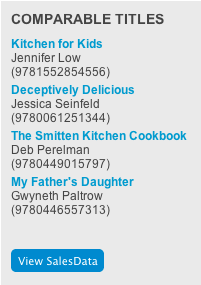In my last post, I looked at what it means to implement ONIX 3.0, and came to the conclusion that it meant carrying enough “granularity” to improve metadata accuracy to support international sales. And I suggested that even ONIX files shared only within Canada will still need to implement new support in order to co-exist in a supply chain that supports international metadata. I hope that I also showed that ONIX 2.1 supports most of the same ability (even if ONIX 3.0 does it better), and that international support means everyone pulling up their meta-bootstraps.
PubFight 2013: The Art of the "Comp"
 Last week on the blog, 2012 PubFight champ Bill Holt weighed in on his scientific approach to the PubFight auction. But publishers and retailers alike know there is more to acquisitions and frontlist buying than science alone. While science certainly plays an important role, a lot of seasoned editors and buyers have good instincts about how a new book will sell based on experience—the art of buying rather than the science, if you will. But if you’re new to the industry, how do you learn this art?
Last week on the blog, 2012 PubFight champ Bill Holt weighed in on his scientific approach to the PubFight auction. But publishers and retailers alike know there is more to acquisitions and frontlist buying than science alone. While science certainly plays an important role, a lot of seasoned editors and buyers have good instincts about how a new book will sell based on experience—the art of buying rather than the science, if you will. But if you’re new to the industry, how do you learn this art?
How to Win at PubFight
 Greetings. After winning the ultra-competitive BookNet house league last year and coming in a close second to grandmaster Carol the year before, I have been asked divulge all my secrets. A ploy by my coworkers perhaps, but who doesn’t like to pretend that they know a thing or two about a thing. Or two. Whatever.
Greetings. After winning the ultra-competitive BookNet house league last year and coming in a close second to grandmaster Carol the year before, I have been asked divulge all my secrets. A ploy by my coworkers perhaps, but who doesn’t like to pretend that they know a thing or two about a thing. Or two. Whatever.
PubFight 2013: Put Your Game Face On
 As a relative newcomer to publishing, joining the PubFight league with the people who invented it is a little intimidating.
As a relative newcomer to publishing, joining the PubFight league with the people who invented it is a little intimidating.
If you haven’t heard of PubFight, it is a fantasy publishing league that helps to develop inventory and P&L management skills using actual market data. You can learn all about it here.
Now let’s get serious—here are some of the key things I discovered during the BNC auction.
Ethics, Data and More at Book Summit 2013
If You Build It, They Will Build
 As the book industry focuses on reaching web-enabled readers, there’s an increasing need for technologies, like apps and APIs, that can be built quickly and altered often. This is why last month, a week before BookExpo America, New York played host to a significant publishing event: the Publishing Hackathon!
As the book industry focuses on reaching web-enabled readers, there’s an increasing need for technologies, like apps and APIs, that can be built quickly and altered often. This is why last month, a week before BookExpo America, New York played host to a significant publishing event: the Publishing Hackathon!
Easy Tips for Mobile-Friendly Emails
The State of Childhood E-Reading So Far
 Children are now, for the most part, being raised as digital natives in North America. Their little fingers become adept at swiping screens at an early age, but parents and educators are still debating whether children should be reading much online. Where do things stand now? We’re working on some consumer research of our own to find out, but in the meantime I thought we could look at what’s happening in the US and UK.
Children are now, for the most part, being raised as digital natives in North America. Their little fingers become adept at swiping screens at an early age, but parents and educators are still debating whether children should be reading much online. Where do things stand now? We’re working on some consumer research of our own to find out, but in the meantime I thought we could look at what’s happening in the US and UK.
How One App Helps Build Personal Ebook Libraries through Bundling
Just Browsing
 How do you like to browse? Browse the internet, that is.
How do you like to browse? Browse the internet, that is.
So many of us simply use whichever browser came pre-installed on our computers—and if you’re using a desktop PC, chances are that browser is Microsoft’s Internet Explorer. If you click on a big blue ‘e’ to get to the internet from your computer, then you can count yourself among the Internet Explorer users across the country.




